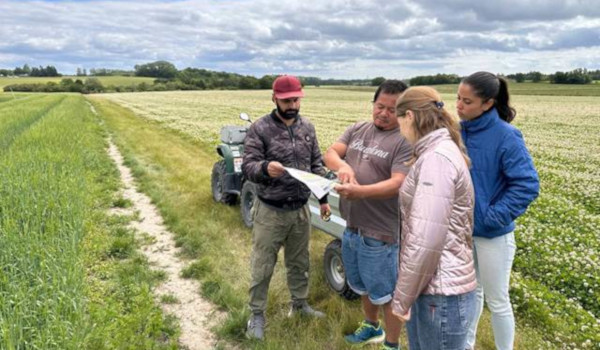International cooperation between Ukraine and Denmark. Experience exchange within the framework of the Ecotwins project
The students’ research topics are based on joint field studies of the participating countries concerning agroecological practices, including: the productivity of cereal and leguminous cover crops, the provision of ecosystem services, the yield response to the application of biostimulants, environmental impact assessment, life cycle assessment, and the evaluation of cover crops as food and feed.
We, Iryna Shpakovych, a PhD student at the Department of Genetics, Plant Breeding, and Seed Production named after Prof. M.O. Zelenskyi, and Eduard Franchuk, a student at the Faculty of Agrobiology, had a unique opportunity to study in modern laboratories with state-of-the-art equipment as part of the Ecotwins project at the University of Copenhagen (Denmark). There, we learned about innovative research methods in the fields of agronomy, agroecology, and sustainable agriculture.
At the university's educational and research center, under the guidance of Bhim Bahadur Ghaley and his PhD students, we collected plant samples from experimental plots, learned scientific methods, and analyzed data used by researchers at the University of Copenhagen. Together with Saad Mir, a PhD student at the university, we compared the yield of green mass and dry matter from different experiment variants and replications, and also studied the infestation of plants by pests.
An
interesting part of the work was the identification and preservation of pests
that infested the plants in the experimental variants.
Albert Colom, an assistant, and Vaibhav Chaudhary, a PhD student,
conducted an interesting workshop for us on determining leaf surface area using
the Easy Leaf/Canopy Area software. These programs allow researchers to quickly
and accurately measure the leaf area of plants, which is an important indicator
of their productivity. We learned how to use these programs on various plant
species and were impressed by their accuracy and ease of use.
During
the program, we had the opportunity to visit the research fields, greenhouses,
and laboratories of the University of Copenhagen. Besides the field and
laboratory experiments within the project, Lene Korsholm Jorgensen introduced
us to the modern laboratories of the university, explained their operating
principles, and suggested that next time, we could conduct a workshop on
working with the equipment in the molecular biotechnology laboratories.
"I was
impressed by the scale and diversity of the research projects
being conducted here."
— Eduard
We had an exciting experience with Jens Carl Streibig, a professor at the university, and a DJI Mini 3 Pro drone. The professor kindly demonstrated his drone piloting skills. “I'm just an amateur photographer,” he joked. We exchanged practical and theoretical knowledge on the use of agricultural drones for applying plant protection products.
*Photographs of the university's research and educational center taken during the joint discussion on drone technologies.
Participating in the Ecotwins experience exchange program was an unforgettable experience for us. We gained valuable knowledge and skills in agronomy and sustainable agriculture, and also established connections with like-minded individuals from around the world. We are confident that this experience will be beneficial for our future careers.
International projects are a wonderful opportunity for young researchers to travel, compare, and evaluate scientific and creative achievements. In addition to studying and conducting research at the University of Copenhagen, during our free time, we couldn’t miss the chance to visit and admire the famous Little Mermaid on the coast, which has been gazing at the handsome prince from the sea for years, in the homeland of Hans Christian Andersen. We were pleasantly impressed by the parks, where special attention is given to the formation of tree canopies.
Therefore,
participating in international programs, learning from foreign colleagues'
experiences, is not only an opportunity to expand your circle of valuable
scientific acquaintances, but also a way to make new friends, discover new
horizons (by the way, this trip was part of the HORIZON project), and of
course, it's a wonderful opportunity to travel and have a great time. We hope
that in the near future, more young scientists will boldly collaborate with
researchers from around the world, more joint projects will be carried out with
repetitions in all parts of the world, because science is a collective endeavor
that should have no boundaries, including territorial and linguistic barriers.
We thank the Ecotwins project, especially its coordinator Oksana Tonsi, for the opportunity to learn from the best scientists at the University of Copenhagen. We also thank Bhim Bahadur Ghaley for the opportunity to work under his guidance, for participating in brainstorming sessions to solve complex issues, and for the chance to learn new things. And to all project participants, thank you for your support and assistance.
Iryna
Shpakovych,
PhD
student at the Department of Genetics, Plant Breeding,
and Seed
Production named after Prof. M.O. Zelenskyi
Eduard
Franchuk,
student
at the Faculty of Agrobiology
